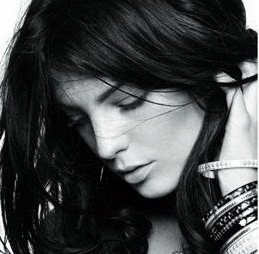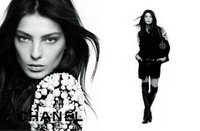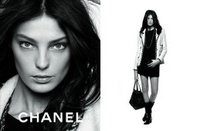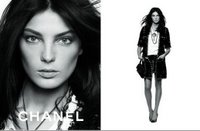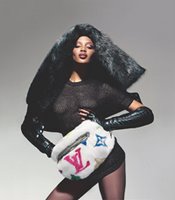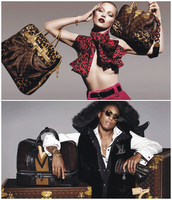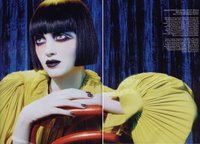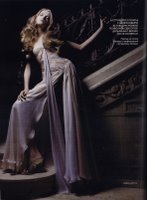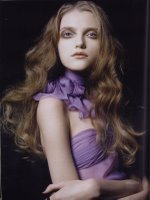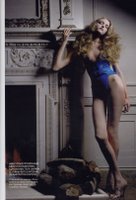Haute Couture: July 5- July 7

Christian Dior
July 6, 2:30 pm,Polo de Paris, Route des Moulins, Bois de Boulogne - Paris 16e


 Let us not be so prosaic as to ask exactly what Joan of Arc, Siouxsie Sioux, Botticelli, and the forties French film actress Arletty may have to do with one another—we’ve arrived in the parallel universe known as John Galliano’s Christian Dior. So, on with the show! It’s a parade of medieval warrior-women in gilded chain mail, copper verdigris gowns, and glass diadems, each equipped with an armored sleeve. It’s a bizarre troupe of goth-punks in outsize black-and-red folded 3-D shapes fashioned from trash-bag plastic. It’s a mincing line of forties ladies in pea-green and magenta doublet-jacketed crepe suits sporting lobster parts for hats. And then it’s a perambulating collection of Tuscan topiary, with pennants and trumpets poking out atop.
Let us not be so prosaic as to ask exactly what Joan of Arc, Siouxsie Sioux, Botticelli, and the forties French film actress Arletty may have to do with one another—we’ve arrived in the parallel universe known as John Galliano’s Christian Dior. So, on with the show! It’s a parade of medieval warrior-women in gilded chain mail, copper verdigris gowns, and glass diadems, each equipped with an armored sleeve. It’s a bizarre troupe of goth-punks in outsize black-and-red folded 3-D shapes fashioned from trash-bag plastic. It’s a mincing line of forties ladies in pea-green and magenta doublet-jacketed crepe suits sporting lobster parts for hats. And then it’s a perambulating collection of Tuscan topiary, with pennants and trumpets poking out atop.
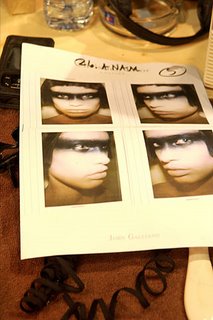 All this—and, be assured, there was more—played out against the backdrop of a Renaissance garden underneath a sky that alternated between blood-red storm clouds and a spinning astrological wheel taken from an illuminated manuscript. Such historicist games, richly yet randomly referenced, are, of course, part of the perverse delight of any John Galliano presentation. This season, the connecting threads of his allusions even managed to make sense in places. He refined the dark-ages militarism that appeared earlier on Dior's ready-to-wear runway, explored the parallels between doublet and hose and tunics and leggings, and hinted at a surrealist subtext that seems a pretty apt response to the here and now. Between the theatrics, there were also some amazingly covetable draped gowns in sugarplum, white, and peach. These showed up just before the finale: Galliano dropping in to take his bow, dressed as a spaceman.
All this—and, be assured, there was more—played out against the backdrop of a Renaissance garden underneath a sky that alternated between blood-red storm clouds and a spinning astrological wheel taken from an illuminated manuscript. Such historicist games, richly yet randomly referenced, are, of course, part of the perverse delight of any John Galliano presentation. This season, the connecting threads of his allusions even managed to make sense in places. He refined the dark-ages militarism that appeared earlier on Dior's ready-to-wear runway, explored the parallels between doublet and hose and tunics and leggings, and hinted at a surrealist subtext that seems a pretty apt response to the here and now. Between the theatrics, there were also some amazingly covetable draped gowns in sugarplum, white, and peach. These showed up just before the finale: Galliano dropping in to take his bow, dressed as a spaceman.
To watch the show, click here 
Valentino
July 6, 8:30 pm, Théâtre National de Chaillot - Paris 16e
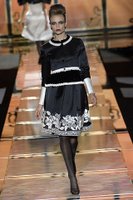
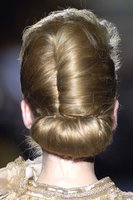
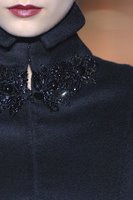 With a nod in the direction of Russia—and perhaps a wink to the female members of the superspending emergent oligarchy—Valentino opened his Fall couture show with a black swing coat heavily decorated with folkloric embroidery. He took his themes from Russian palaces, art treasures, and handicrafts, but themes never deflect this designer too far from his lifetime’s focus, which is simply to make his women feel special. By outfit three, a superb bubble coat in black duchesse satin that was reminiscent of the fifties but perfect for a young woman of today, it was apparent he was going to break up the references with a few beautiful pieces untethered to any narrative.
With a nod in the direction of Russia—and perhaps a wink to the female members of the superspending emergent oligarchy—Valentino opened his Fall couture show with a black swing coat heavily decorated with folkloric embroidery. He took his themes from Russian palaces, art treasures, and handicrafts, but themes never deflect this designer too far from his lifetime’s focus, which is simply to make his women feel special. By outfit three, a superb bubble coat in black duchesse satin that was reminiscent of the fifties but perfect for a young woman of today, it was apparent he was going to break up the references with a few beautiful pieces untethered to any narrative.
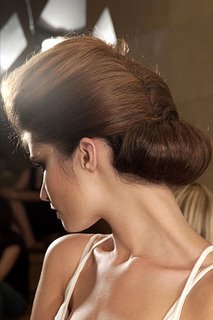 Bell-skirted cocktail dresses and skirt suits in embroidered tweed or topped with minute gold-lace cardigans could bear a glancing resemblance to Russian dolls or icons—but it doesn’t really matter. What does is that the silhouettes look young and right for the moment, and that the handwork is extraordinary. Evening dresses stood as a master class in the flawless refinement that has been his trademark since he opened for business in Rome in 1959. One in particular, a draped black-chiffon goddess gown with an asymmetric shoulder strap fastened with a ribbon cockade, had a timeless beauty any woman would cherish. In the week that he celebrates his Légion d’honneur, the audience gave Valentino loud applause for the lifelong and unwavering pursuit of his vision.
Bell-skirted cocktail dresses and skirt suits in embroidered tweed or topped with minute gold-lace cardigans could bear a glancing resemblance to Russian dolls or icons—but it doesn’t really matter. What does is that the silhouettes look young and right for the moment, and that the handwork is extraordinary. Evening dresses stood as a master class in the flawless refinement that has been his trademark since he opened for business in Rome in 1959. One in particular, a draped black-chiffon goddess gown with an asymmetric shoulder strap fastened with a ribbon cockade, had a timeless beauty any woman would cherish. In the week that he celebrates his Légion d’honneur, the audience gave Valentino loud applause for the lifelong and unwavering pursuit of his vision.
To watch the show, click here Chanel
Chanel
July 7, 10:30 am,Pelouse de Saint Cloud - Bois de Boulogne - Porte de Passy
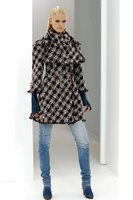
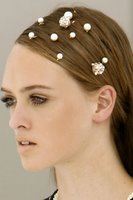
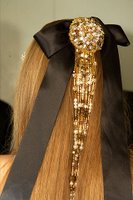 With his sharp knack for synthesizing the mood of the moment into the spirit of Chanel, Karl Lagerfeld came up with a couture statement that might neatly be labeled “mod medieval.” In a short, leggy collection shown entirely with thigh-high boots, some in distressed denim, he compressed a tough vibe into a sequence of abbreviated suits and tunic dresses marched out at high speed around a stark-white runway.
With his sharp knack for synthesizing the mood of the moment into the spirit of Chanel, Karl Lagerfeld came up with a couture statement that might neatly be labeled “mod medieval.” In a short, leggy collection shown entirely with thigh-high boots, some in distressed denim, he compressed a tough vibe into a sequence of abbreviated suits and tunic dresses marched out at high speed around a stark-white runway.
The skinny-leg device showcased Lagerfeld’s deft handling of new proportions. It started with a narrow, molded shoulder line falling to dresses with a slight flare in the hem, or to short, belled skirts articulated to swing underneath tweed jackets. One outstanding cardinal-red duchesse-satin coat with a huge bubble collar was a succinct reply to the vexed refrain of whether “volume” can be truly desirable—no question, if it looks that gorgeous.
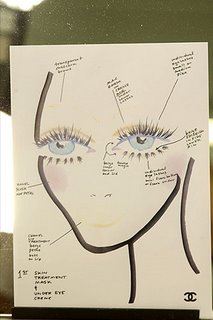 Still, for all the rigor of line, there was rich Chanel craftsmanship in every piece. Jeweled buttons and belts, embroideries of exploding stars, pearl and diamond hair decorations, dense patches of appliqué and stones, and smotherings of black satin bows conspired to give a fleeting impression of armor and heraldic pageantry—that’s where the sense of futuristic medievalism came into play. It all passed at such relentless velocity, though, the details were difficult to catch, at least until the very last moment. When the girls finally stood still, the audience, watching from seats on a central dais, suddenly found itself revolving, carousel-style, at leisure to inspect every look. Great trip, in every sense.
Still, for all the rigor of line, there was rich Chanel craftsmanship in every piece. Jeweled buttons and belts, embroideries of exploding stars, pearl and diamond hair decorations, dense patches of appliqué and stones, and smotherings of black satin bows conspired to give a fleeting impression of armor and heraldic pageantry—that’s where the sense of futuristic medievalism came into play. It all passed at such relentless velocity, though, the details were difficult to catch, at least until the very last moment. When the girls finally stood still, the audience, watching from seats on a central dais, suddenly found itself revolving, carousel-style, at leisure to inspect every look. Great trip, in every sense.
To watch the show, click here
 After such a long time Daria Werbowy is back to the magazines, well... I'm not sure that she is really back to the fashion world but it was a nice surprise to find Daria on the cover of Russian issue of Madame Figaro (Dec 2006)! Plus she is not only a covergirl but also has a nice editorial inside, interview and generally she is more like a celebrity in this issue, this mag is full of Daria pix! I do not have enoght time to translate the interview now but after reading it I must say that Daria seems to become more wise, she is more confident and feels more comfortable in her skin. She began with talking about her flat in NY and that she wants to repair it herself and that Ukranian traditions are very strong in her family and her and her brother (Orest) and sister (Oksana) speak Ukranian and they know history and traditions of the country and that she is planning to visit it next year.
After such a long time Daria Werbowy is back to the magazines, well... I'm not sure that she is really back to the fashion world but it was a nice surprise to find Daria on the cover of Russian issue of Madame Figaro (Dec 2006)! Plus she is not only a covergirl but also has a nice editorial inside, interview and generally she is more like a celebrity in this issue, this mag is full of Daria pix! I do not have enoght time to translate the interview now but after reading it I must say that Daria seems to become more wise, she is more confident and feels more comfortable in her skin. She began with talking about her flat in NY and that she wants to repair it herself and that Ukranian traditions are very strong in her family and her and her brother (Orest) and sister (Oksana) speak Ukranian and they know history and traditions of the country and that she is planning to visit it next year.

















 Chanel
Chanel




